
Introduction of Moringa Oleifera:
Dr. Monica Marcu, Ph.D. - "Moringa is an extraordinary plant. It's a plant that has all the nutrients that could be found in a perfect food."
According to Dr. Lydia M. Marero of the Food and Nutrition Research Institute of the Philippines, Moringa oleifera is one of the world's most useful plants. It is used as food, effective water treatment, antibiotic, source of oil, and coagulant for turbid waters.
Moringa Oleifera has several health benefits that are one of the reasons why it is named the “Miracle Tree” and the “Tree of Life” in many cultures. People benefit from Moringa Oleifera both in terms of prevention and healing. Moringa Oleifera is nutritious, natural and energizing.
.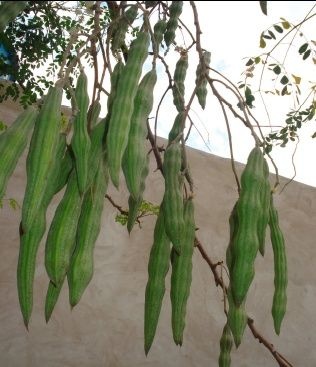
The immature pods are the most valued and widely used of all the tree parts. The pods are extremely nutritious, containing all the essential amino acids along with many vitamins and other nutrients. The immature pod can be eaten raw or prepared like green peas or green beans, while the mature pods are usually fried and possess a peanut-like flavor. The pods also yield 38 - 40% of non-drying, edible oil known as Ben Oil. This oil is clear, sweet and odorless, and never becomes rancid. Overall, its nutritional value most closely resembles olive oil. The thickened root is used as a substitute for horseradish although this is now discouraged as it contains alkaloids. The leaves are eaten as greens, in salads, in vegetable curries, as pickles and for seasoning. The Bark can be used for tanning and also yields a coarse fiber. The flowers, which must be cooked, are eaten either mixed with other foods or fried in batter and have been shown to be rich in potassium and calcium.
Uses of Moringa Oleifera :
These are some of the uses of Moringa Oleifera:
- Moringa Oleifera for Diabetes Relief
- Moringa Oleifera for Healthy Skin
- Moringa Oleifera for Nutrition
- Moringa Oleifera to sleep better
- Moringa Oleifera for decreased depression and anxiety
Properties & Chemical Constituents:
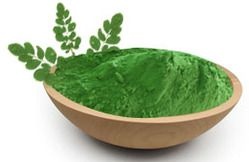
-
Moringa has following properties:
- 92 Nutrients
- 46 Antioxidants
- 36 Anti-Inflammatories
- 18 Amino Acids, 9 Essential Amino Acids
- Nourishes The Immune System
- Supports Normal Glucose Levels
- Natural Anti-Aging Benefits
- Provides Anti-Inflammatory Support
- Promotes Healthy Digestion
- Promotes Heightened Mental Clarity
- Boosts Energy Without Caffeine
- Encourages Balanced Metabolism
- Promotes Softer Skin
- Provides Relief From Acne
- Supports Normal Hormone Levels
The Vitamin and Minerals Component of Moringa Leaves and Pods
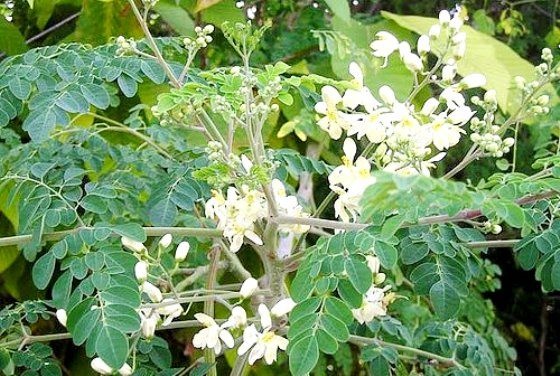

-
Vitamins are soluble either in water or in lipids. They help regulate almost all physiological processes in the body. When any vitamin is absent from the diet the body begins to show signs of deficiency. Minerals are also essential for our health; they are used by our body for building tissues such as bones, teeth, muscles. Some minerals are components of enzymes and help to regulate metabolic function of the body. Lack of minerals in diet can impair normal functioning of the body and may lead to a number of disease. Without enough calcium and phosphorous our bones fail to grow properly. The detail of vitamins and minerals in Moringa’s fresh & dried leaves and its pod are presented in the following tables.
-
Table No. 1: Moringa Oleifera Pods [Raw]
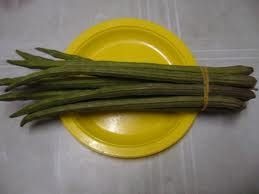
-
Nutritional Value Per 100 g (3.5 oz)
37 kcal (150 kJ)
0.20 g
8.53 g
2.10 g
Dietary fiber
3.2 g
88.20 g
Vitmans
4 μg
30 mg
0.0530 mg
0.36 mg
0.074 mg
45 mg
0.620 mg
0.259 mg
0.794 mg
50 mg
0.120 mg
461 mg
44 μg
42 mg
141.0 mg
0.45 mg
-
Table No. 2: Moringa Oleifera Leaf Nutrient Composition
-
Fresh Leaves (Value/100g)
Dried Leaves (Value/24g)
Calories
92 cal
49 cal
Macronutrients
Protein
6.70 g
6.5 g
Fat
1.70 g
0.55 g
Carbohydrates
12.5 g
9.2 g
Micronutrients
Carotene (Vit.A)
6.78 mg
4.54 mg
Thiamin (B1)
0.06 mg
0.63 mg
Riboflavin (B2)
0.05 mg
4.92 mg
Niacin (B3)
0.8 mg
1.97 mg
Vitamin C
220 mg
4.15 mg
Calcium
440 mg
480.72 mg
Copper
0.07 mg
0.14 mg
Fiber
0.90 g
4.61 g
Iron
0.85 mg
6.77 mg
Magnesium
42 mg
88.32 mg
Phosphorus
70 mg
48.96 mg
Potassium
0.26 g
0.32 g
Zinc
0.16 mg
0.79 mg
-
Amino Acids: The foundation of our body
Table No. 3: Amino Acids Composition of Dried Moringa Leave
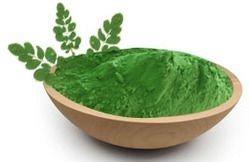
-
Amino Acid
Quantity
Amino Acid
Quantity
Arginine
1.78
Methionine*
0.297
Serine
1.087
Valine*
1.413
Aspartic acid
1.43
Phenylalanine*
1.64
Glutamic acid
2.53
Isoleucine*
1.177
Glycine
1.533
Leucine*
1.96
Threonine*
1.357
Histidine*
0.716
Alanine
3.033
Lysine*
1.637
Tyrosine
2.65
Cysteine
0.01
Proline
1.203
Tryptophan*
0.486
HO-Proline
0.093



